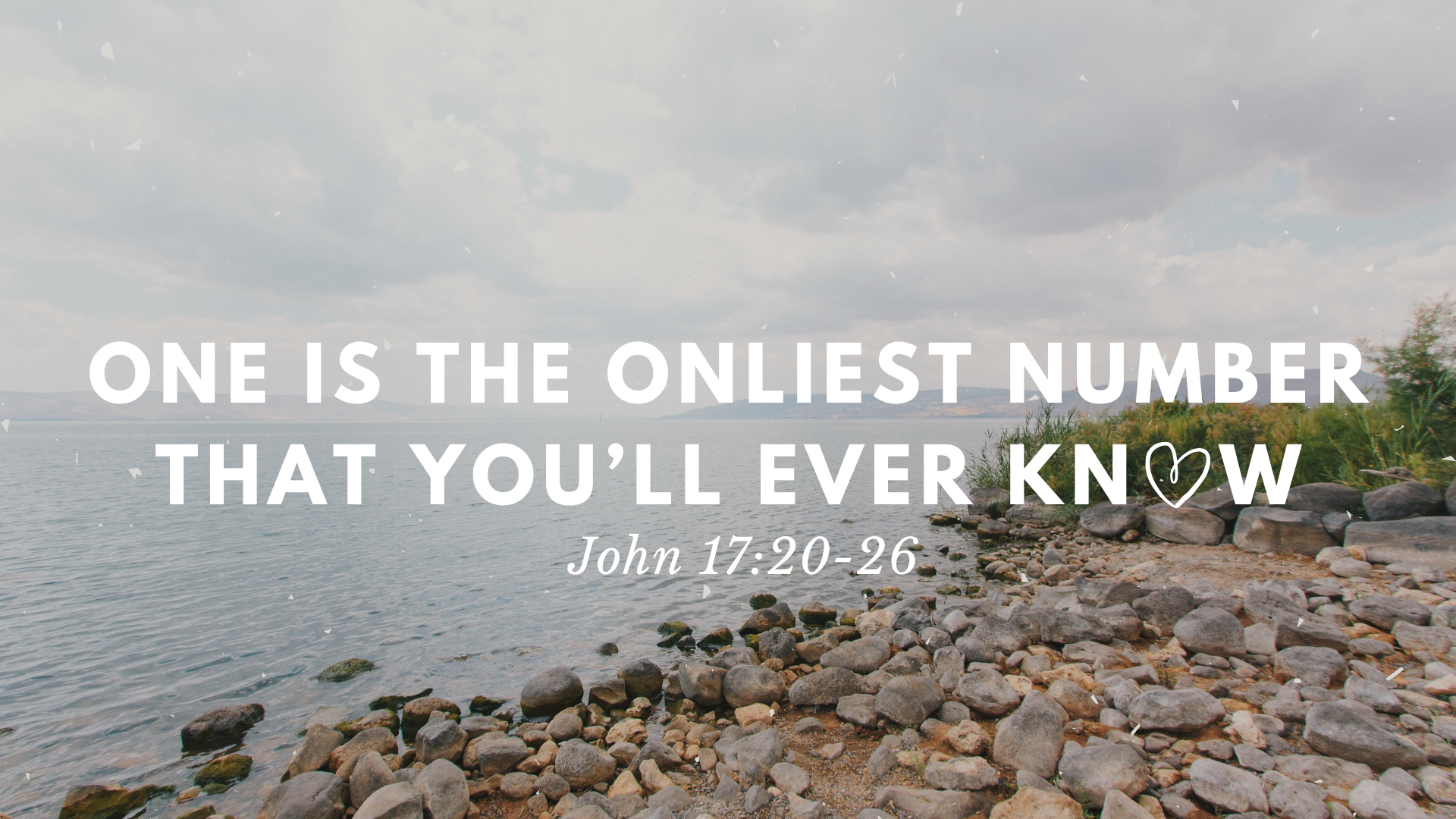
You’re Gonna Need A Bigger Net (John 21:1-25)
My Uncle Dan Romaniello was an accomplished fisherman. In his retirement he and my Aunt Philomena lived in a cabin near Big Bear Lake. Uncle Dan had a boat docked there, ready to set out at a moment’s notice.
His vocabulary did not include the word, ‘limit.’
Ten fish was the limit Fish & Game set. From trout #11 on, the catch was stuffed into seat cushions.
Some day I will tell you about the time I became hypothermic on the boat. Uncle Dan was so in the zone that he didn’t realize I was frozen. Once he did, and understood the urgency, we headed in. I think he might have been trolling on the way.
The apostle John saw fit to close his Gospel by telling a fish story.
After toiling all night, the disciples came up empty. From shore, Jesus told them to drop their nets on the other side of the boat. It resulted in a staggering catch.
Nearly four years prior, the Lord had called fishermen to follow Him, saying, “Follow Me, and I will make you fishers of men” (Matthew 4:19). The time had come for them to embark upon their calling.
Spoiler alert: They would simultaneously be shepherds.
Jesus tells Peter, “feed My lambs… tend My lambs… feed My sheep.”
The two professions perfectly communicate our mission during the Church Age as we wait for the coming of Jesus:
Fishers of men evangelize unbelievers.
Shepherds nurture believers, equipping and edifying them to themselves go out as fishers of men.
I’ll organize my comments around two points: #1 Grace, Not Gear, Is Needed To Fish For Men, and #2 Brokenness, Not Boasting, Is Needed To Shepherd Men.
#1 – Grace, Not Gear, Is What Is Needed To Fish For Men (v1-11)
Hooper arrived in The Flicka. It was outfitted with every modern gadget, all the appropriate gear, that you’d expect on a research vessel.
To eliminate Jaws, however, the Amity City Council hired Quint. His boat, The Orca, well… let’s just say it was barely seaworthy.
Jesus prefers Orcas to Flickas.
Joh 21:1 After these things Jesus showed Himself again to the disciples at the Sea of Tiberias, and in this way He showed Himself:
Places get renamed. In 1963, Cape Canaveral was renamed Cape Kennedy. Ten years later, Floridians changed it back. The Sea of Galilee was called the Sea of Tiberias by the Romans to honor the Emperor.
Jesus told the disciples that after being raised from the dead He would go before them to Galilee (Matthew 26:32). They were there, waiting.
Joh 21:2 Simon Peter, Thomas called the Twin, Nathanael of Cana in Galilee, the sons of Zebedee, and two others of His disciples were together.
Why only these seven? We are not told. We’ve seen that John’s writing style involved groups of seven. It’s fun to discover them.
Joh 21:3 Simon Peter said to them, “I am going fishing.” They said to him, “We are going with you also.” They went out and immediately got into the boat, and that night they caught nothing.
Were they right to put out the Gone Fishin’ sign? My current attitude is, “Why not fish?” They needed to sustain themselves waiting for the Lord.
More importantly, underline, “that night they caught nothing.” These guys were fishermen by trade, and the Sea of Galilee was teeming with fish.
Their total inability to catch even one fish illustrates the need to depend upon God in their man-fishing.
Joh 21:4 But when the morning had now come, Jesus stood on the shore; yet the disciples did not know that it was Jesus.
I’ve officiated more than a few open casket funerals. In some cases, the deceased looked strangely different – almost like another person. Imagine how different a resurrected man might look.
Then, too, Jesus enjoyed hiding His identity from disciples before making a big reveal of Himself.
Joh 21:5 Then Jesus said to them, “Children, have you any food?” They answered Him, “No.”
“Children” can be translated “friends,” or “lads.” Jesus asked them what you ask any fisherman: “Did you catch anything?”
Joh 21:6 And He said to them, “Cast the net on the right side of the boat, and you will find some…”
The remains of a first-century fishing boat were not too long ago discovered in the mud of the Sea of Galilee. It is 26’ long and 7½’ wide. The “right side of the boat” was not far enough away to matter.
They didn’t know it was Jesus, but we do. It’s simple: Without the direction of Jesus there was no catch, but with it, there was as great a catch as possible.
Jesus must lead you to your spiritual fishing holes. Once there, don’t trust in your gear, but in His grace.
Joh 21:6 And He said to them, “Cast the net on the right side of the boat, and you will find some.” So they cast, and now they were not able to draw it in because of the multitude of fish.
Jesus was quite the fisherman:
In the Gospel of Luke, the disciples follow Jesus’ instruction, and their catch was so great that it threatened to sink two boats (5:7-8).
In Matthew, Jesus sent Peter to catch a fish that would have a coin in its mouth so that Peter could pay the Temple Tax (17:27).
Jesus twice multiplied dead fish to feed multitudes.
Joh 21:7 Therefore that disciple whom Jesus loved said to Peter, “It is the Lord!” Now when Simon Peter heard that it was the Lord, he put on his outer garment (for he had removed it), and plunged into the sea.
John was “the disciple whom Jesus loved.” We are not told why he had this nickname. True, John was part of what some call an inner circle, and was present at many significant events that other disciples were not.
But “Jesus loves me, this I know…”
God is incapable of loving anyone more than someone else. He loves us as He loves His own Son.
King David was… “The man after God’s own heart.” Is he the only one, ever, who was a man after God’s own heart? The Lord has a designation for you, too.
Joh 21:8 But the other disciples came in the little boat (for they were not far from land, but about two hundred cubits), dragging the net with fish.
The Lord could disappear as fast as He appeared. Maybe Peter figured the weight of the catch would slow the boat too much.
Joh 21:9 Then, as soon as they had come to land, they saw a fire of coals there, and fish laid on it, and bread.
Joh 21:10 Jesus said to them, “Bring some of the fish which you have just caught.”
It was the first Boat & Breakfast. Jesus was about to commission them to be fishers of men and spiritual shepherds. We would understand it as an ordination ceremony.
It isn’t exaggerating to say this was one of the most important breakfasts in history. It was informal, with no fanfare or guest speakers, no certificates or wallet cards. No tri-tip.
Joh 21:11 Simon Peter went up and dragged the net to land, full of large fish, one hundred and fifty-three; and although there were so many, the net was not broken.
Is the number, 153, significant? Probably, but most of the explanations are allegorical nonsense. One interesting fact: Pythagoras calculated that 153 is the denominator of the closest known fraction to the square root of 3, which as a fraction is 265/153. So what? Well, this is the ratio of a fish shape drawn between two overlapping circles which are centered on each other’s circumference.
When drawn, it looks like the Christian ICTHUS fish that early believers used.
Employing tried and true gear and methods, drawing from years of experience, in a lake teeming with fish, with strong nets, toiling all night, they caught nothing.
Depending on the Lord, in just a few minutes they limited out.
Let’s not overlook the effort Peter made to get to the Lord, and to bring in the catch. They were 100 yards out when Peter put on his outer garment and jumped in. That in itself is a little strange. If you want to swim faster, you remove clothing and equipment that could hinder you.
If you are a strong swimmer, you might not think 100 yards is challenging. But in addition to being fully clothed, Peter had been toiling all night, and this was an open-water swim. On shore, Peter drug (dragged?) the net alone.
Peter’s response to Jesus is nothing less than full throttle. He definitely exerted himself. How does this fit with total dependence on Jesus? It fits perfectly. F. LeRoy Forlines explains,
“It is a misunderstanding of Scripture for us to reduce ourselves to instruments for God to use or channels for God to work through. These metaphors are all right if we do not press them too far. When we press them to the point that we are passively to yield ourselves to God with the idea that we are to do nothing and let God use us like puppets, we are overlooking the truth that God has made us as persons and treats us accordingly in His dealings with us.”
We are both dependent and independent. Our independence is subordinate but not passive. We are told to run the race, press forward, work while there is time, pursue holiness “without which no one will see the Lord” (Hebrews 12:14).
Are you coming up empty in some part of your life? Maybe you can’t get victory over sin; or your relationships are struggling. It could be you are casting your net for wisdom and guidance on the wrong side, listening to the world and not the Word.
The right side – the Lord’s side – is often radical, foolish, in the eyes of men. So be a fool and follow.
#2 – Brokenness, Not Boasting, Is Needed To Shepherd Men (v12-25)
“This day, my God, I hate sin not because it damns me, but because it has done Thee wrong. To have grieved my God is the worst grief to me.”
Charles Spurgeon said that, but it sounds a lot like something Peter could say. His grief comes up in his after breakfast talk with Jesus.
Joh 21:12 Jesus said to them, “Come and eat breakfast.” Yet none of the disciples dared ask Him, “Who are You?” – knowing that it was the Lord.
Jesus did a lot of popping-in. The disciples probably alternated between thinking they saw Jesus everywhere, and thinking they wouldn’t see Him anymore.
Joh 21:13 Jesus then came and took the bread and gave it to them, and likewise the fish.
Joh 21:14 This is now the third time Jesus showed Himself to His disciples after He was raised from the dead.
The resurrected God-man remains a servant. Jesus isn’t waiting on you hand and foot.
He serves you by enabling you to walk in obedience and thereby grow.
Joh 21:15 So when they had eaten breakfast, Jesus said to Simon Peter, “Simon, son of Jonah, do you love Me more than these?” He said to Him, “Yes, Lord; You know that I love You.” He said to him, “Feed My lambs.”
Joh 21:16 He said to him again a second time, “Simon, son of Jonah, do you love Me?” He said to Him, “Yes, Lord; You know that I love You.” He said to him, “Tend My sheep.”
Joh 21:17 He said to him the third time, “Simon, son of Jonah, do you love Me?” Peter was grieved because He said to him the third time, “Do you love Me?” And he said to Him, “Lord, You know all things; You know that I love You.” Jesus said to him, “Feed My sheep.”
It will help us if we first explain a few things:
This is not Peter being forgiven and restored after his three denials. Jesus had previously appeared privately to Peter (First Corinthians 15:5).
The Lord cannot be reminding Peter of his sin. Forgiven sins are as far from you as the East is from the West, never to be brought up by the Lord again.
The Lord and Peter use two different words for “love,” but it turns out that is of no consequence. Language scholars say, “In John’s Gospel this is an example of synonymous usage, as both agape and phileo are used for the Father’s love for the Son (3:35; 5:20), the Father’s love for the saints (14:23; 16:27), and Jesus’ love for Lazarus (11:3, 5, 36).”
It is a mistake to think that the different Bible words for love are in competition with each other.
Jesus and Peter have agape & phileo for each other. I like that – a lot! It means that Jesus agapes & phileos me. He has the unconditional love of God for me, AND we are friends and brothers who phileo one other.
The three questions are obviously associated with Peter’s denials. He remained “grieved” by them.
Let’s hear that quote from Spurgeon again: “This day, my God, I hate sin not because it damns me, but because it has done Thee wrong. To have grieved my God is the worst grief to me.”
Forgiven and restored, commissioned and sent out, Peter would never forget his denials that had grieved the Lord.
The apostle Paul tells us to forget “those things which are behind and [reach] forward to those things which are ahead” (Philippians 3:13). Nevertheless, Paul remained grieved by his persecution of Christians, and his struggle between the spirit and the flesh.
Peter was a broken person who had been restored by the Lord. It would encourage him to be a more nurturing shepherd. An overseer, not an overlord.
In his first letter to the church, Peter wrote, “Shepherd the flock of God which is among you, serving as overseers, not by compulsion but willingly, not for dishonest gain but eagerly; nor as being lords over those entrusted to you, but being examples to the flock; and when the Chief Shepherd appears, you will receive the crown of glory that does not fade away” (5:2-3).
Joh 21:18 “Most assuredly, I say to you, when you were younger, you girded yourself and walked where you wished; but when you are old, you will stretch out your hands, and another will gird you and carry you where you do not wish.”
Joh 21:19 This He spoke, signifying by what death he would glorify God. And when He had spoken this, He said to him, “Follow Me.”
Peter would receive the promise of the Spirit. He would enjoy a great catch man-fishing on the Day of Pentecost, then go on to shepherd those who were saved. He would be the apostle who opened salvation to the Gentiles.
Jesus shared His foreknowledge of Peter’s future. Jesus was describing Peter being crucified as His martyr. Church history records Peter asking to be crucified upside down because he felt unworthy to be crucified in the same manner as Jesus.
Notice Jesus said, “When you are old.” Peter would be around for a while. Jesus has not shared His foresight of my life. I think all of you would say the same. No worries; He has foresight, and is working all things together for good. I might be surprised when something happens, but Jesus is not.
Joh 21:20 Then Peter, turning around, saw the disciple whom Jesus loved following, who also had leaned on His breast at the supper, and said, “Lord, who is the one who betrays You?”
They were walking, and John was politely hanging back. Peter and John had a special relationship.
We will see them ministering together, in the Book of Acts, healing the lame man. Peter couldn’t help wondering if John would also be martyred.
Joh 21:21 Peter, seeing him, said to Jesus, “But Lord, what about this man?”
We assume Peter was asking out of some jealousy or rivalry. Why not out of love for John, to give him a glimpse of his future?
Joh 21:22 Jesus said to him, “If I will that he remain till I come, what is that to you? You follow Me.”
Don’t compare yourself to other believers. Don’t do it to feel sorry or superior. A servant answers to his master, not to other servants.
Joh 21:23 Then this saying went out among the brethren that this disciple would not die. Yet Jesus did not say to him that he would not die, but, “If I will that he remain till I come, what is that to you?”
Christians interpreted Jesus’ words to mean John would not die until Jesus returned. It was true, but not in the way they thought.
As an old man in his nineties, John received the Revelation of Jesus. He was transported to Heaven and in that way he did see the Lord’s coming before he died.
Joh 21:24 This is the disciple who testifies of these things, and wrote these things; and we know that his testimony is true.
Joh 21:25 And there are also many other things that Jesus did, which if they were written one by one, I suppose that even the world itself could not contain the books that would be written. Amen.
We read the Bible literally, but not like Drax. In the MCU, Drax is from a race that takes everything absolutely literal, with no accounting for figures of speech. It makes for great on-screen humor.
John was using hyperbole to express the extent of God’s love for mankind.
You’ve heard the expression, “By hook, or by crook.” The phrase came into usage with the translation of the New Testament into English in 1380 by John Wycliffe. It’s believed that it was derived from our Scripture today:
The hook is the fishhook.
The crook is the staff of a shepherd.
The hook & the crook symbolize evangelism and nurturing.
Perhaps we should adopt a version as a mission statement:
Calvary Hanford
By hook; then by crook.







